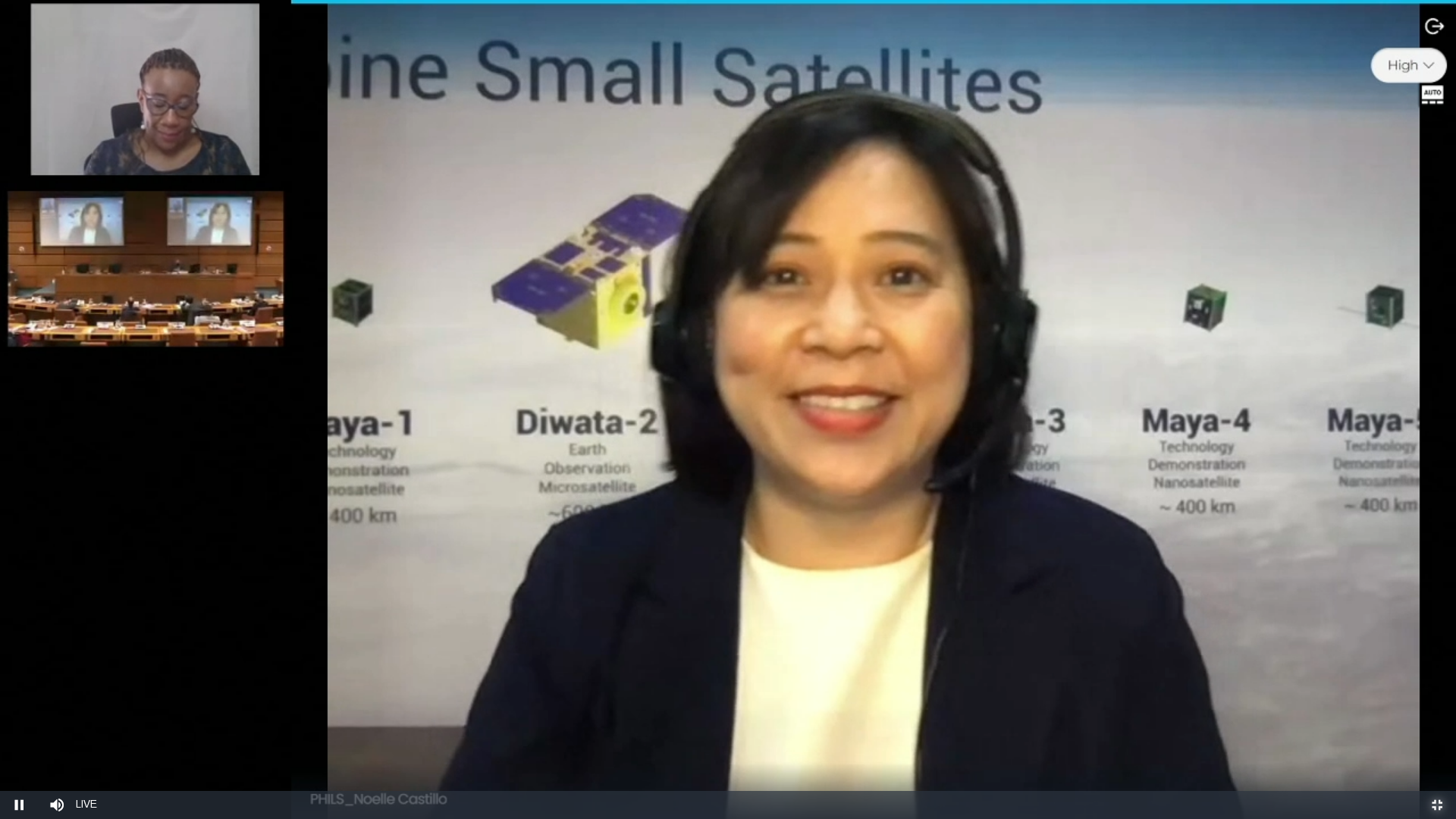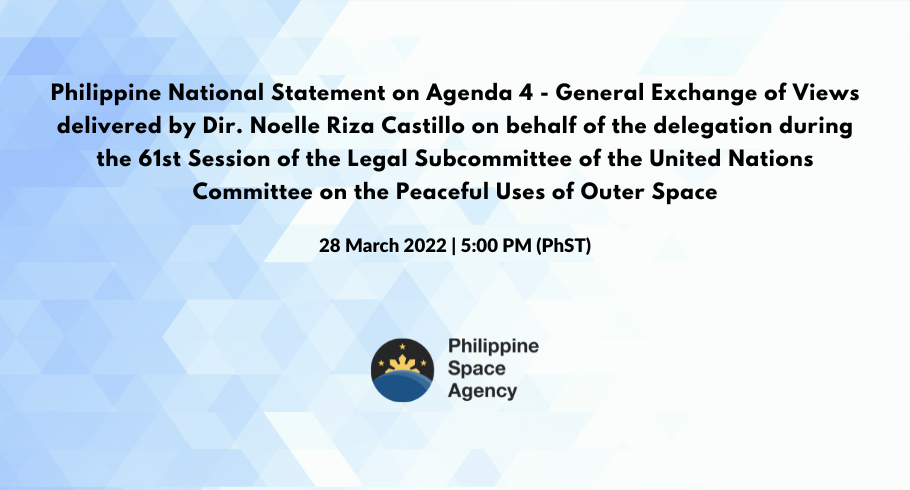61ST SESSION OF THE LEGAL SUBCOMMITTEE OF THE
UNITED NATIONS COMMITTEE ON THE PEACEFUL USES OF OUTER SPACE
PHILIPPINE NATIONAL STATEMENT
AGENDA ITEM NO. 4 “GENERAL EXCHANGE OF VIEWS”
28 MARCH 2022 | 11 AM – 1 PM CET | VIA INTERPREFY
delivered by
ATTY. NOELLE RIZA D. CASTILLO
DIRECTOR, SPACE POLICY AND INTERNATIONAL COOPERATION BUREAU
PHILIPPINE SPACE AGENCY (PhilSA)
Distinguished delegates,
Since this is the first time our delegation is taking the floor, the Philippines wishes to congratulate Ms. Nomfuneko Majaja of South Africa on her election. Our delegation assures the Chair of our full support and active participation in the proceedings of this session.
We likewise express our congratulations and gratitude to Dr. Setsuko AOKI of Japan for her hard work and able leadership that led to the successful conduct of the previous session.
Our delegation also wishes to express our appreciation of Mr. Niklas Hedman, the Acting Director of the Office for Outer Space Affairs, and the Secretariat for their excellent preparations for this session.
Madam Chair and distinguished delegates,
The Philippines fully aligns itself with the statement of the Group of 77 and China on this agenda item, and we wish to make the following remarks in our national capacity.
The Philippines attaches great importance to ensuring that the country abides by the international space treaties and principles promulgated by the United Nations. We support efforts toward further universalisation of the treaties, with a view that the five treaties constitute the cornerstone of international space law, and that ratification and accession by all will significantly contribute toward ensuring a safe, secure, inclusive and sustainable space environment and space activities.
Since the 60th session of the Legal Subcommittee, the Philippine Space Agency or PhilSA has successfully conducted multi-stakeholder consultation with relevant government agencies as part of our efforts to ratify the Liability Convention and accede to the Registration Convention. These efforts are aligned with the policy directive provided to us by the Philippine Space Act. PhilSA is pleased to have received support in this endeavor from other government agencies, and is optimistic about the eventual formal adoption of the UN space treaties in the country.
The Philippines has also taken effort to furnish the UN Register of Objects Launched into Outer Space with information for the registration of our satellites: Maya-1, Diwata-2 and Maya-2 in 2021 and Maya-3 and Maya-4 in 2022, in conformity with the General Assembly Resolution 1721 B (XVI) of 20 December 1961. Our country is working toward establishing our own national registry in parallel with our efforts to accede to the Registration Convention. We encourage all States to do the same, guided by the principles of transparency and sustainable use of outer space.
We recognize that non-legally binding UN instruments on outer space can complement the existing UN treaties and fill in gaps in the governance of outer space activities. The Philippines encourages the voluntary implementation of these instruments for those in a position to do so. Nevertheless, we also recognize that there are some challenges in the implementation of these non-legally binding instruments especially for many developing countries who do not yet have the necessary legal, regulatory, scientific and technical frameworks and capabilities. We stress the importance of capacity-building in this regard.
The Philippines attaches great importance to capacity-building in space law, and will further discuss our efforts on this matter under the stand-alone agenda item.
As part of our efforts in voluntary implementation of UN guidelines on space activities, we wish to inform the Subcommittee that the Philippine Space Council recently approved the resolution creating an interim interagency Technical Working Group (TWG) on Orbital Debris Protocols to identify further areas of action and develop recommendations on national protocols and standard procedures for preventing and responding to risks posed by orbital debris and other outer space activities of concern. The Space Debris Mitigation Guidelines, as well as the 21 Guidelines on the Long-Term Sustainability of Outer Space Activities, will provide substantial guidance to the work of this TWG.
Madam Chair and distinguished delegates,
On the agenda on space resources, the Philippine delegation welcomes the establishment of a dedicated Working Group, and expresses our full support to its Chair, Mr. Andrzej Misztal of Poland, and Vice Chair, Mr. Steven Freeland of Australia. We encourage the Working Group to adopt its Terms of Reference, method of work, and work plan in the current session. With regard to the Working Group’s substantive discussions, our delegation is of the view that the exchange of views and recommendations to be developed should be as inclusive as possible, and should take into consideration the needs and requirements of developing countries that will enable them to participate and benefit in such activities that require highly-advanced capabilities in space.
In closing, Madame Chair, the Philippines reaffirms its commitment to preserve the peaceful, responsible, and sustainable use of outer space for the benefit of all humanity.
Thank you very much.

Atty. Noelle Riza D. Castillo, Director of the Space Policy and International Cooperation Bureau, delivering the Philippines’ Statement on Agenda No. 4, “General Exchange of Views”.
-END-




